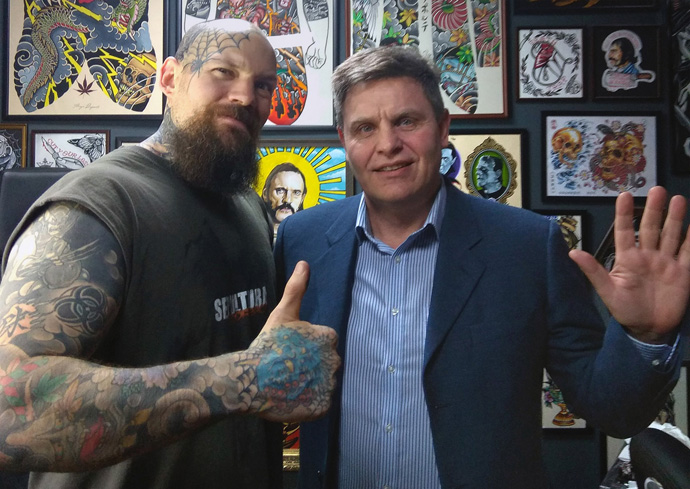The Rev. Lev Shults (right), pastor of the Russian-speaking Agape United Methodist Church in Prague, visits a tattoo parlor. Shults believes you cannot always wait for people to come to church, the church needs to also go to the people. Photo by Urs Schweizer, Central Conference of Central and Southern Europe.
By Urs Schweizer
Feb. 21, 2020 | PRAGUE, Czech Republic (UM News)
As leader of the only Russian-speaking United Methodist congregation in the Czech Republic, Pastor Lev Shults knows about the need for reconciled cooperation across the borders of cultures and nations. That is why he calls it a blessing that in his church, Russians and Ukrainians — despite the antagonism between their countries of origin — share a common journey.
“I believe that Christians coming from different countries should always be able to find common ground in Jesus Christ,” he said. But he is also aware of reality: “Unfortunately, not every Russian or Ukrainian church can claim the same.”
Shults isn’t blinded by an idealistic view of a life as a disciple of Jesus Christ. His great-grandfather was persecuted for his faith, accused of being an enemy of the people, sentenced to death on Stalin’s orders and executed by firing squad in 1937. His father, pastor of two Russian parishes, was a German prisoner of war for three years. But Shults, too, dedicates his life to the proclamation of the Gospel.
“I am convinced that as a pastor and a missionary, I carry a certain responsibility to use every opportunity that God opens up to me to share the Gospel,” he said.
He founded Agape United Methodist Church in Prague in late 2017, joining 22 other Czech-speaking churches in the country. There are about 100,000 Russian-speaking people living in the area of capital city Prague, though most of them do not attend any local church. Shults’ church currently has about 30 members, and he makes a point to go outside the church walls to create relationships with the surrounding community.
“If we make ourselves available to the Lord for his use, he will bring us in touch with all kinds of people, from the famous and respected to the simple and despised,” Shults said.



